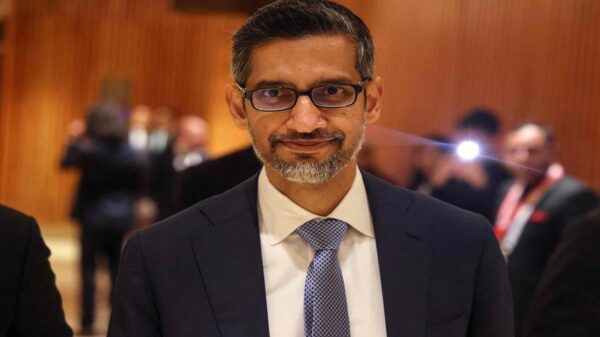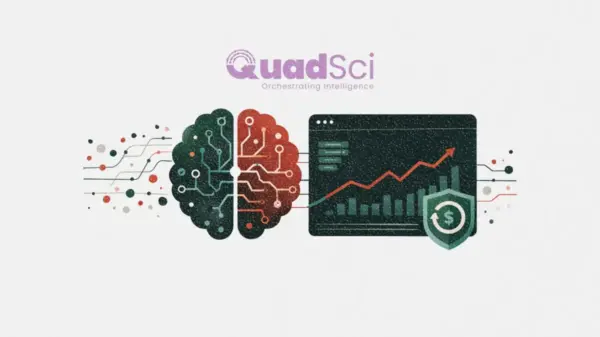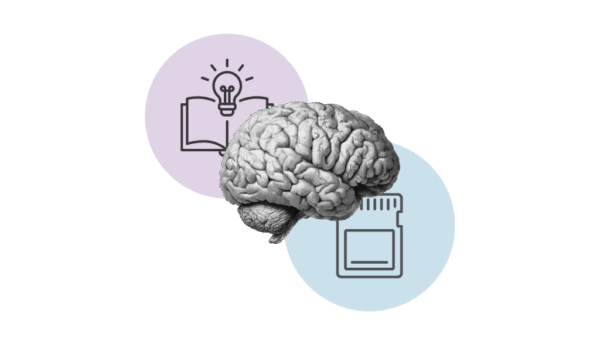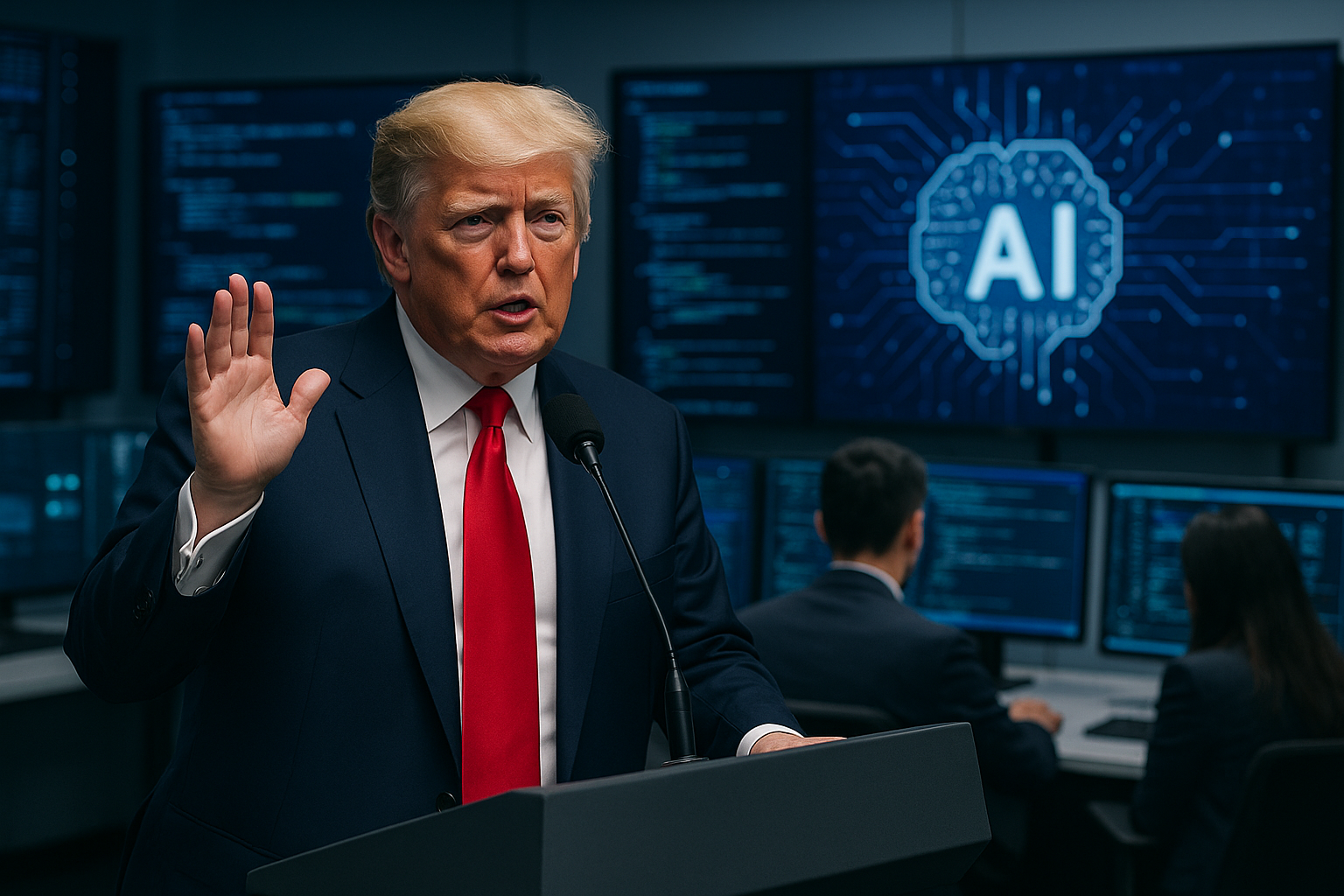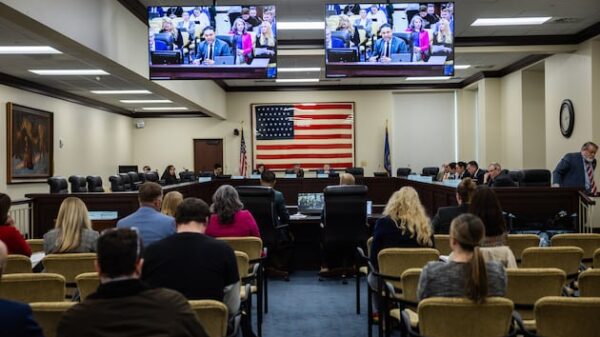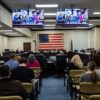In a significant move that underscores the growing intersection of politics and technology, President Donald Trump is contemplating an executive order aimed at giving the federal government unilateral authority to regulate artificial intelligence (AI). This order, which could be signed as soon as Friday, proposes the establishment of an “AI Litigation Task Force,” overseen by the Attorney General, specifically responsible for challenging state laws that may hinder the growth of the AI sector.
According to a draft of the executive order obtained by The Verge, this task force would have the power to sue states whose regulations obstruct AI industry development. Notably, it highlights state laws in California concerning AI safety and “catastrophic risk” as well as a Colorado statute aimed at preventing “algorithmic discrimination.” The task force is also expected to consult a group of special advisers, including venture capitalist David Sacks, who serves as a special adviser for AI and cryptocurrency.
Recently, Trump has voiced his intention for a moratorium on state AI regulations, framing it as a defense against what he describes as “woke” ideology. During a recent appearance at the US-Saudi Investment Forum, he stated, “You can’t go through 50 states. You have to get one approval. Fifty is a disaster. Because you’ll have one woke state and you’ll have to do all woke.” This rhetoric is part of a broader narrative in which Trump seeks to curb ideological influences he perceives as detrimental to national progress.
The proposed executive order is aligned with Trump’s AI Action Plan, issued earlier this year, which tasked several federal agencies—including the FCC, the Department of Justice, and the Federal Trade Commission (FTC)—with exploring methods to bypass “onerous” state laws to stimulate innovation in AI. Should the order be enacted, it will provide a structured roadmap over the next 90 days for these agencies to follow. The Secretary of Commerce will be responsible for identifying states that violate these directives, possibly affecting their eligibility for the Broadband Equity Access and Deployment (BEAD) program, a federal initiative funding rural broadband access.
Challenges to State Regulations
During a September appearance at Politico’s AI & Tech Summit, Brendan Carr, a commissioner at the FCC, suggested a legal interpretation of the Communications Act that could enable the FCC to override state laws deemed obstructive to the deployment of modern infrastructure. He indicated that if a state law effectively prohibits the deployment of AI technology, the FCC may have grounds to intervene.
Additionally, Carr raised concerns about California’s potential new law requiring AI companies to disclose their safety testing models, claiming it could conflict with Trump’s initiatives aimed at preventing “woke AI” that carries ideological biases. He referred to the European Union’s Digital Safety Act, stressing his apprehension that such regulations might promote biased AI models rather than objective, truth-seeking algorithms.
Despite these aggressive regulatory proposals, the executive order and the establishment of the litigation task force may encounter legal challenges. Critics argue that the federal government’s authority to override state laws in this manner could lead to significant constitutional debates.
Congressional Dynamics and Future Implications
The executive order is reportedly a backup plan for the White House, should Congress fail to impose a moratorium on state AI laws through the reauthorization of the National Defense Authorization Act (NDAA). The NDAA is a crucial piece of legislation that must be passed to fund national security initiatives. Previous attempts to include a moratorium in Trump’s “Big Beautiful Bill,” which outlined his second-term spending agenda, faced bipartisan opposition.
House Majority Leader Steve Scalise recently indicated that Congress might attempt another push for a moratorium by attaching it to the NDAA. However, like the previous effort, this initiative may face resistance, particularly if it involves punitive measures such as withholding broadband funding from non-compliant states. Experts question how effectively legislators can leverage federal funding to influence state policy changes, especially in large states like California, which may be less susceptible to such pressures.
As the political landscape evolves, the outcomes of these regulatory efforts and their implications for the AI industry remain to be seen. The ongoing debate emphasizes the delicate balance between fostering innovation and ensuring ethical standards in AI technology, a challenge that will likely continue to resonate across various sectors in the coming years.
See also Google Launches Major AI Engineering Centre in Taiwan, Strengthening Global Tech Ties
Google Launches Major AI Engineering Centre in Taiwan, Strengthening Global Tech Ties Accenture Report: 62% of Government Workers Believe AI Can Reduce Workloads
Accenture Report: 62% of Government Workers Believe AI Can Reduce Workloads RNIT AI Solutions Secures ₹3.52 Crore Order, Stock Jumps 9% Amid Digital Expansion
RNIT AI Solutions Secures ₹3.52 Crore Order, Stock Jumps 9% Amid Digital Expansion Government Partners with HD Hyundai to Boost AI in Shipbuilding Sector
Government Partners with HD Hyundai to Boost AI in Shipbuilding Sector Africa Faces Surge in AI-Driven Cyber Attacks as Global Espionage Grows, Report Reveals
Africa Faces Surge in AI-Driven Cyber Attacks as Global Espionage Grows, Report Reveals










